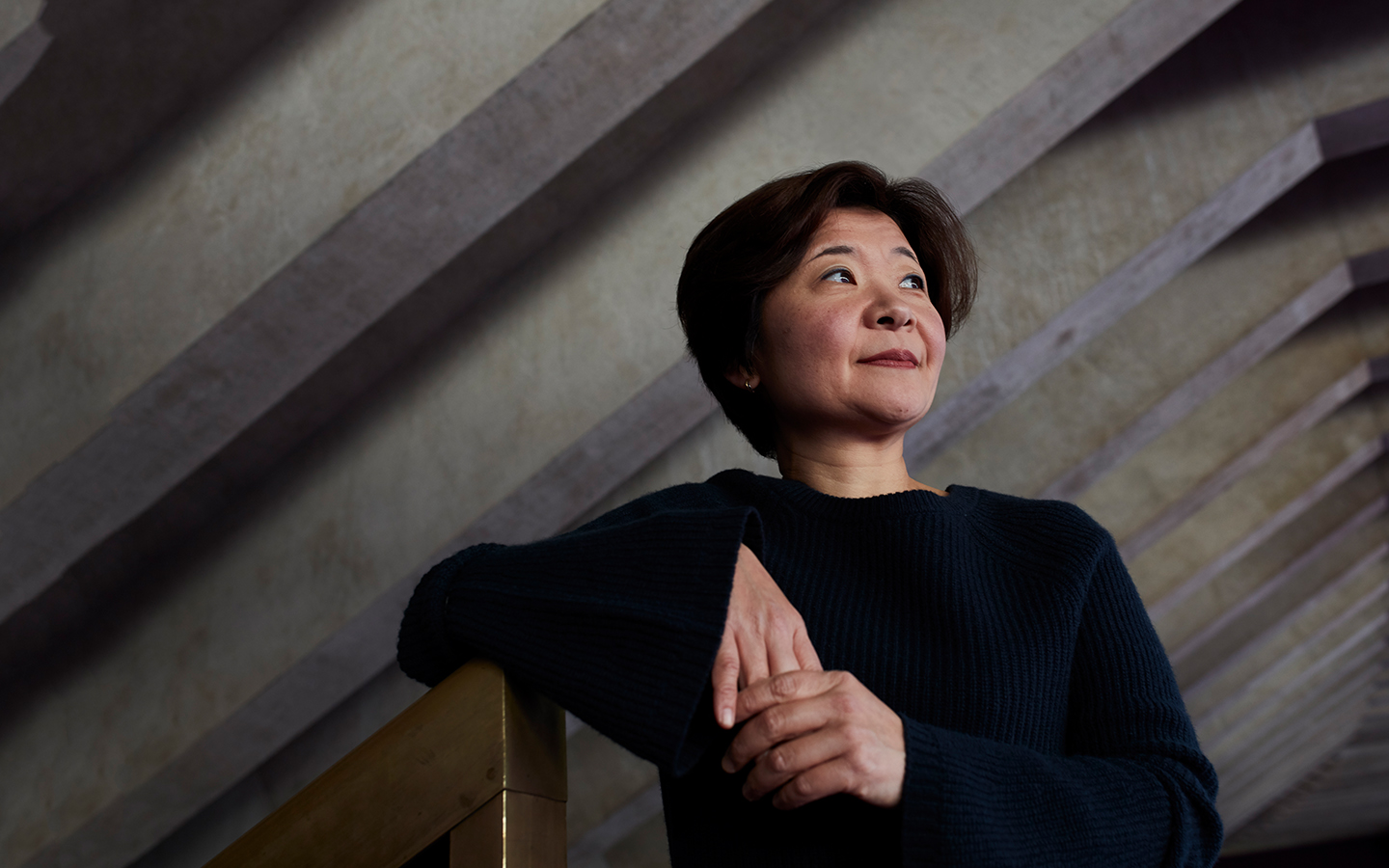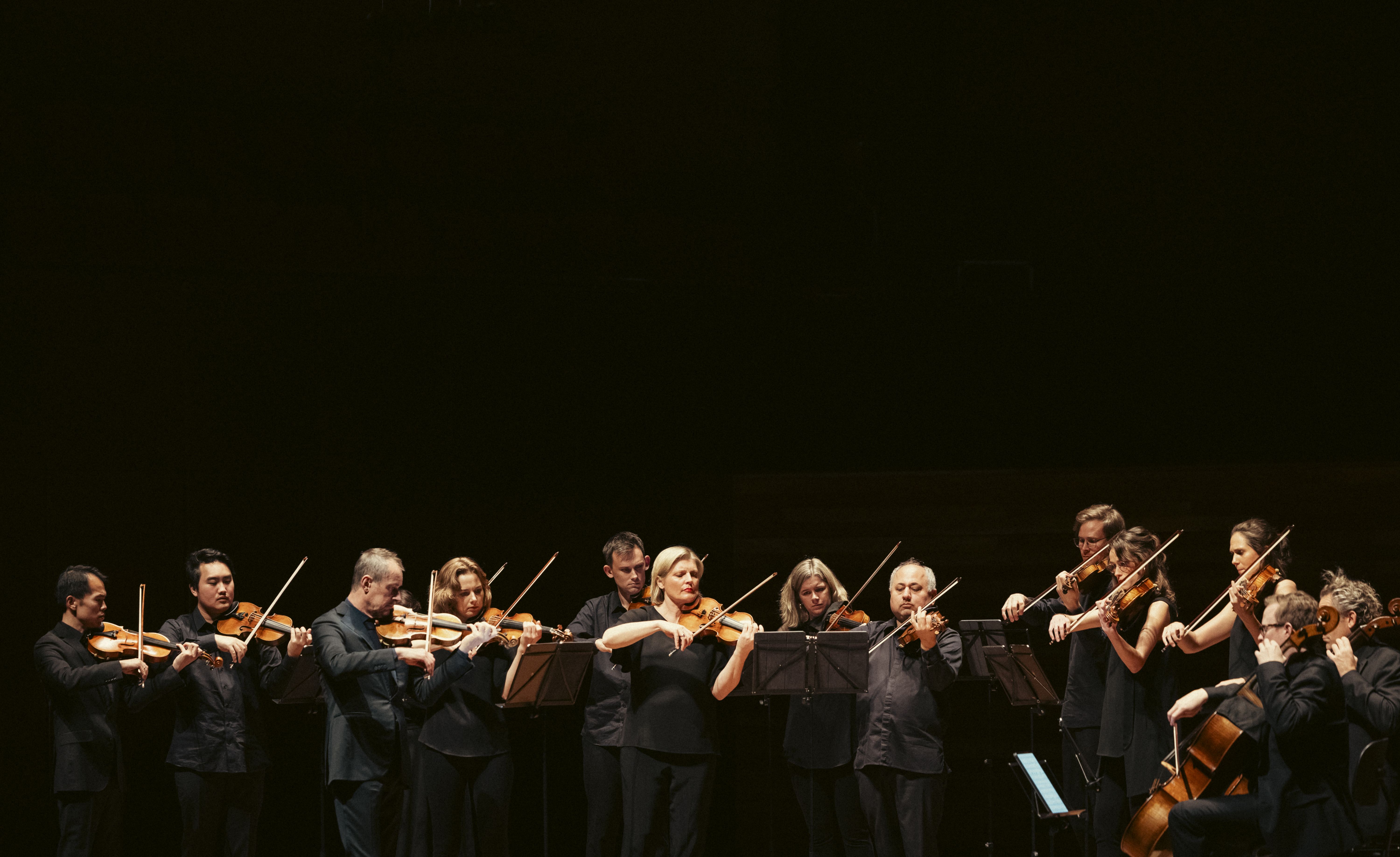
In conversation with Aiko Goto
Passing on the legacy of Japan's musical greats.
The prestigious Ozawa Matsumoto Festival (OMF) is set to be held in Matsumoto (Nagano Prefecture), Japan in August through September again this year. ACO violinist Aiko Goto is a regular member of the Saito Kinen Orchestra, which performs at the festival each year.
On a chilly Sydney morning in June, we sat down for a coffee with Aiko before she rushed off to an ACO rehearsal.
Tell us about your connection with the Saito Kinen Orchestra (SKO)?
I’ve been a part of SKO since 1995. The orchestra was formed in 1984 at the call of Japanese conductor Seiji Ozawa and Kazuyoshi Akiyama. The name Saito in the orchestra’s title refers to Hideo Saito, a brilliant educator and one of the founders of Toho Gakuen School of Music – a leading music institution in Japan. The orchestra gathered about 100 musicians who had received instruction from Saito before making their mark on the world. The year 1984 marked 10 years since Saito’s death, and every summer since, musicians usually found performing all around the world, gather in Matsumoto in the Japan Alps, and give concerts under the musical direction of Maestro Ozawa. This opportunity to reacquaint is like the Tanabata Festival, with the key players only able to meet once a year. For me, the chance to participate in SKO is a great inspiration and stimulation – an invaluable experience.
The festival is held in the Japanese summer, which is mid-winter in Australia and overlaps with our ACO performance season. But I somehow manage to weave it into my schedule and make sure I get to Matsumoto every year.
– SKO is famous as a gathering of top-level world-class musicians. You could even say it's a dream orchestra. How would you describe musical director Seiji Ozawa?
When I attended The Juilliard School of Music, I remember very clearly being given the essay topic “My hero” and I didn’t hesitate to write with gusto about Seiji Ozawa (laughs). His presence has been an overwhelming influence on me – both then and now.
I first met Maestro Ozawa in a music class as a student at Toho Gakuen Music High School in Tokyo. He was already based in Boston at the time, but never failed to drop in on chamber music and orchestra classes on his visits home. You could feel his aura the moment he stepped into a classroom. There was a tension – born from awe and respect – which made us all sit up straight. In an instant our music changed. I still feel that aura at SKO now: the maestro appears, and the orchestra’s sound is suddenly different. He’s got this incredible charisma.
In my high school class, I remember distinctly how he’d nod his head as he stood behind the conductor. During instruction, I’d watch his face as he listened attentively to each student’s performance – there was a message for everyone in his eyes. It wasn’t necessarily a message that could be conveyed with words. I felt it even stronger when he later conducted the Toho Orchestra at Les Rencontres Musicales d'Evian (Evian Music Festival). That’s how he is when he faces the music with sincerity and works to draw out the potential in young musicians.
– You spend a great deal of energy as an educator of the younger generations. In addition to regular performances with the ACO, you lead the ACO Academy program and you also teach at the Seiji Ozawa Music Academy.
Yes that’s right. Recently, I’ve had many opportunities to take on the roles of string orchestra leader and teacher. I’ve spent my life being nurtured by eminent teachers and my superiors in SKO, and I’ve been deeply influenced by friends and those older than me at Toho and Juilliard. I’m always thinking about how to pass on these experiences to the young musicians of today.
For instance, even though I didn’t have a personal connection with SKO’s Hideo Saito, I’ve had the chance to sense his spirit by learning from his former students, such as Seiji Ozawa, violinist and violist Masao Kawasaki, and violist Nobuko Imai. Ozawa and other SKO members talk of how Saito was incredibly passionate and extremely strict, often berating his students, but that he treated them with love and respect.
In my very first lesson with Mr Kawasaki, I was totally shocked because he proceeded to tell me everything I lacked. He was cool and calm and not trying to squash my talent; he took utmost care in my lessons to ensure I never lost what was good about me. At the time, I was just desperate to learn, and now as I get older, his words come back to me more than ever.
Over the past ten years, when I go back to Japan in the winter, I sit in and observe Ms Imai’s lessons. She never acts superior and she looks closely at each of her students and works tirelessly to extract and extend their unique qualities, while also supplementing in areas where they are lacking. I learn so much from this approach.
Likewise, at SKO, no matter what kind of performer Maestro Ozawa is dealing with, he pours all his energy into them to help bring out their potential and their spirit. Young people respond so quickly because they’re so earnest and hungry for it.
Since last year, I’ve also been teaching at Seiji Ozawa Music Academy. The instructors are all senior members of SKO who perfectly capture the spirit of Ozawa and Saito, with a teaching style characterized by a sincere approach to music and generous instruction built on affection for the students. I find it so stimulating. I’ve got a long way to go before I reach the level of these other teachers, but the fact is there are different teaching styles and we need to work earnestly with each student to draw out their energy and react sincerely to the music together. My task now is to make sure I can share that core style.
– How do you think your experience as a teacher is reflected in your performances?
The biggest joy in teaching is seeing the change and improvement in young musicians. It’s so encouraging for me. I learn so much in return from my students, and it’s a great caution to myself to never let my performance level fall. Young people are always looking upward. One day they’ll surpass their teachers and blossom.
And this is the case even for those not directly under our tutelage. Young people full of potential come to our performances to see us playing on the stage and hear our music. We can’t give them a sub-par performance – that’s enough to make me sit up straight.
– Playing in a chamber orchestra like the ACO must be very different to the SKO which is a symphony orchestra. What's the appeal of playing with SKO?
They are totally different styles but motivate me equally and foster within me the same level of tension. They both have good kinds of pressure: the ACO being that we take the stage as a group of just 17; the SKO being that I perform with so many world-class musicians. In addition, performers change seats for each song on the festival program and we take turns as concertmaster. This year again, as with last year, I have the honor of performing as concertmaster for Mozart’s “The Marriage of Figaro, Overture”.
The SKO is often said to have a passionate sound. It’s intense, and the sound is very deep. The music has an energy, pulsing with Saito’s emotions and Ozawa’s passion. I think an energy builds up from the excitement of meeting all together just once a year. There’s a mutual recognition that for a year we all worked so hard wherever we were in the world, and we share a conviction to work hard until we meet again the next year.
And because it’s a festival, the whole town gets into the swing of it. On one occasion, there were more than 10,000 festival volunteers. As you know, Matsumoto is a town known for its rich natural environment and deep history and culture. It is also famous as the birthplace of the Suzuki method. The atmosphere during the festival is just amazing.
I really hope you will visit sometime!
The Seiji Ozawa Matsumoto Festival runs 17 August – 7 September 2019. Mozart’s “The Marriage of Figaro” will be performed at the 1 September “Orchestra Concert with “Peter and the Wolf””.
Interviewers: Kathryn Hunyor (ArtsPeople), Shoko Ono (Sydney-based translator & Koto musician)
今年8月、長野県にて開催されるセイジ・オザワ松本フェスティバルに参加するACOの後藤和子(ごとう・あいこ)氏は、フェスティバルのサイトウ・キネン・オーケストラのレギュラーメンバーでもある。6月、南半球の冬の朝、ACOのリハーサルの前に、ヴァイオリンを携えてシドニー市街のカフェに現れた後藤氏に、お話を聞いた。
- サイトウ・キネン・オーケストラ(以下SKO)との関わりを教えてください。
私はSKOに95年から参加させていただいています。SKOは1984年に小澤征爾先生と秋山和慶先生の呼びかけで結成されたオーケストラです。楽団の名称からもわかります通り、桐朋学園の創立者のひとりであり、偉大な教育者であった故齋藤秀雄先生の教えを受け、その後世界各地で活躍している演奏家100余名が集まったのです。この1984年というのは、斎藤秀雄先生が亡くなられてから10年という節目でした。以来、毎夏、世界中に散らばって活躍している演奏家が松本に集まり、今では小澤征爾音楽総監督のもと、コンサートが開催されています。年に一度のメンバー達の再会、七夕みたいですね。SKOに参加させて頂くのは、とても励みになり刺激的で、私にとってかけがいのない機会です。
フェスティバルは夏に開催されますが、オーストラリアでは真冬で、実はACOは演奏会のシーズンなのです。それでも何とかスケジュールの合間を縫って、毎年松本に行っています。
- SKOは、メンバー全員が世界のトップクラスで、大変レベルの高い楽団ということで有名です。まさに夢のオーケストラと言えそうですが、そのオーケストラを率いる小澤征爾総監督は、どのような存在ですか。
ジュリアード音楽院時代に、英語の授業で「私のヒーロー・ヒロイン」という作文の課題があり、迷わずオザワ・セイジ先生について一生懸命書いたのを覚えています(笑)。私にとっては、今も昔も、圧倒的な存在です。
初めて小澤先生にお会いしたのは、桐朋学園音楽科の高校時代でした。当時すでにボストン在住だった先生が、東京に戻られるたびに学校の室内楽やオーケストラのクラスに顔を出してくださっていました。先生が教室に入っていらっしゃると、直ぐに先生のオーラを感じました。畏怖と尊敬で、それはもう、みんな緊張して背筋が伸び、音が急に変わりました。今でもSKOで同じオーラを感じます。先生の登場でオーケストラの音がガラリと変わる。素晴らしいカリスマ性だと思います。
高校のクラスでは、指揮者の後ろでフンフンと首を振っていらしたのが印象的です。指導の場面では、学生ひとりひとりの演奏にじっと聴き入り顔を見つめ、先生の目にはそれぞれにメッセージがありました。これは必ずしも言葉のメッセージではなかった。この先生の姿勢は、のちにエヴィアン国際音楽祭にて桐朋のオーケストラを指揮されたとき、さらに強く感じられました。真摯に音楽に向き合い、若手の能力を引き出す姿勢です。
― ACOでは、通常の演奏会のほかに、若手育成プログラムの中心的存在としてご活躍です。毎冬、十代の学生で結成されるオーケストラACOアカデミーの指導と弾き振りもされ、昨年からは小澤征爾音楽塾(https://ozawa-musicacademy.com)での指導もされています。
最近は指導する立場になることも多くなりました。私はこれまで、先達の先生方やSKOの先輩達に育てていただき、桐朋やジュリアード時代に一緒に学んだ友人・先輩達からも大いに影響を受けてきました。この経験を、若い人達にも伝えられたら、と常に考えています。
たとえば、SKOの故齋藤秀雄先生ですが、私自身は齋藤先生と直接の関わりはなかったのですが、齋藤先生の直弟子だった小澤先生、ヴァイオリンの川崎雅夫先生、ヴィオラの今井信子先生からご指導いただくことにより、齋藤先生のスピリットを感じています。小澤先生をはじめSKOのメンバーの先生方は、齋藤先生は大変情熱的な方で、生徒は怒られてばかり、とても厳しい方だったけれど、愛情をこめて接して下さった、とおっしゃています。
かつて川崎雅夫先生は、一番最初のレッスンで、私に何が足りないかをすべて伝えて下さり、とても衝撃的でした。至って冷静に、しかし突き落とすのではなく、同時に私の良さが損なわれないように最大の配慮を払ってレッスンを重ねてくださった。当時は教わることに必死でしたが、私自身、年を重ねて先生のお言葉がますます蘇ってきています。
ここ十年ほど、冬に帰国するたびに今井先生のレッスンを見学させていただいているのですが、先生は生徒に対し、決して上から目線で接することはなく、生徒それぞれの個性を見極め、良さを引き出し、伸ばす。と同時に、足りない部分を補う。そのアプローチはとても参考になります。
また、SKOでの小澤先生の音楽に対する姿勢は、どのような奏者が相手であっても、先生の全てのエネルギーを注いで、相手の力と心を引き出す。若い人は真剣で貪欲ですから、反応も早いです。
昨年より、小澤征爾音楽塾の講師も務めておりますが、ここでご指導に当たられている先生方は、SKOメンバーの先輩方なのですが、音楽に対する真摯な姿勢や、生徒に対する愛情を込めた豊かなご指導は、まさに小澤先生と故齋藤先生のスピリットそのものです。私にも大いに刺激になっております。 まだまだ先生方のレベルには達していませんが、方法こそ違いはあれ、生徒一人一人と真剣に向き合い、エネルギーを引き出し、ともに音楽を真摯に受け止める。スタイルの根幹は共有できますように精進していきたいと思っています。
- ご自身の中で、指導者としての経験が、演奏にどのように反映されているとお考えですか。
教えていて一番うれしいのは、若い人達の変化や上達です。これが私にとって大変な励みになります。また生徒たちから教わることも多く、私自身も演奏のレベルを落としてはいけない、という自戒になります。若い人たちは、常に上を見ています。いずれは指導者を越え、花を咲かせる。
これは直接指導をしている人たちだけに限りません。可能性を秘めた若者が演奏会に来て、私たちが舞台で弾いている姿を見、音に耳を傾ける。いい加減なものを提供できない、といつも背筋が伸びます。
- ACOは室内楽団、一方でSKOは交響楽団です。最後に、SKOの魅力をお聞かせください。
SKOはACOとまったく違うスタイルですが、私にとってやりがいは同じ、同質の緊張感で臨んでいます。ACOは17人のみのメンバーで舞台に乗りますし、SKOでは、多数の世界の選り抜きの演奏者と共演するわけですから、よい意味でのプレッシャーがあります。加えて、フェスティバルのプログラムでは、一曲ずつ演奏者の席順が変わり、コンサートマスターも交代します。私自身、去年に続いて今年も、モーツァルト『フィガロの結婚』序曲」にてコンサートマスターを務めさせて頂きます。
SKOの音は情熱的である、と評されます。実際、熱く、音がとても深い。故齋藤先生の思い、小澤先生の情熱が脈々と伝わって、音楽が活き活きしてくるのです。それは、年に一度、一同に会するという興奮、ああ、一年間、世界各地で皆さんがんばってきたんだな、また来年再会するまでがんばろう、というエネルギーから来るのかも知れません。お祭りですから、町全体も盛り上がります。以前はフェスティバルのボランティアだけで一万人を超えたこともありました。ご存じのように、松本は自然に囲まれた歴史と文化の町で、スズキメソード発祥の地でもあります。フェスティバル期間中の雰囲気は素晴らしいですよ。
ぜひ一度は足を運んでみてください。
セイジ・オザワ松本フェスティバルは、8月17日から9月7日まで。モーツァルト「『フィガロの結婚』序曲」は、「オーケストラコンサート『ピーターと狼』」(9月1日)にて上演予定。https://www.ozawa-festival.com/en/
聞き手:キャサリン・フニョー(Kathryn Hunyor, ArtsPeople)、大野唱子
